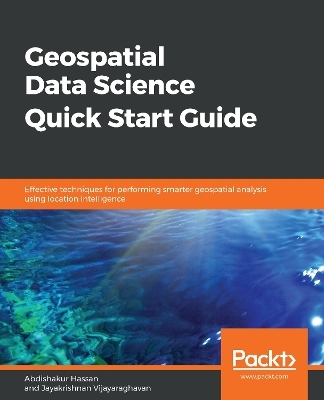
Geospatial Data Science Quick Start Guide
Packt Publishing Limited (Verlag)
978-1-78980-941-1 (ISBN)
Discover the power of location data to build effective, intelligent data models with Geospatial ecosystems
Key Features
Manipulate location-based data and create intelligent geospatial data models
Build effective location recommendation systems used by popular companies such as Uber
A hands-on guide to help you consume spatial data and parallelize GIS operations effectively
Book DescriptionData scientists, who have access to vast data streams, are a bit myopic when it comes to intrinsic and extrinsic location-based data and are missing out on the intelligence it can provide to their models. This book demonstrates effective techniques for using the power of data science and geospatial intelligence to build effective, intelligent data models that make use of location-based data to give useful predictions and analyses.
This book begins with a quick overview of the fundamentals of location-based data and how techniques such as Exploratory Data Analysis can be applied to it. We then delve into spatial operations such as computing distances, areas, extents, centroids, buffer polygons, intersecting geometries, geocoding, and more, which adds additional context to location data. Moving ahead, you will learn how to quickly build and deploy a geo-fencing system using Python. Lastly, you will learn how to leverage geospatial analysis techniques in popular recommendation systems such as collaborative filtering and location-based recommendations, and more.
By the end of the book, you will be a rockstar when it comes to performing geospatial analysis with ease.
What you will learn
Learn how companies now use location data
Set up your Python environment and install Python geospatial packages
Visualize spatial data as graphs
Extract geometry from spatial data
Perform spatial regression from scratch
Build web applications which dynamically references geospatial data
Who this book is forData Scientists who would like to leverage location-based data and want to use location-based intelligence in their data models will find this book useful. This book is also for GIS developers who wish to incorporate data analysis in their projects. Knowledge of Python programming and some basic understanding of data analysis are all you need to get the most out of this book.
Abdishakur Hassan is a geographic information systems (GIS) expert and consultant with over 5 years of experience working with UN-Habitat. He holds an MSc in geoinformation science and earth observations. During his tenure as a GIS expert, Abdishakur has developed fully fledged GIS applications in the urban planning and land administration domains. He is interested in all things related to geospatial data science. Jayakrishnan Vijayaraghavan is a geospatial data scientist, innovator, and author of a book titled ArcGIS for JavaScript developers. He currently resides in the San Francisco Bay Area and has over 8 years of work experience. He has built patented technologies and products in the geospatial domain and has coached teams on leveraging mapping and spatial analytics tools for solving pertinent business problems. He is adept at computational geometry, especially in graph networks and in geospatial inferencing. He is a DAAD scholar and a winner of the UN-Habitat special jury award. He is keen on developing intelligent and ubiquitous mapping systems by integrating ML and DL techniques with GIS. He is also a novelist and a certified UAV pilot.
Table of Contents
Introducing Location Intelligence
Consuming Location Data Like a Data Scientist
Performing Spatial Operations Like a Pro
Making Sense of Humongous Location Datasets
Nudging Check-Ins with Geofences
Let's Build a Routing Engine
Getting Location Recommender Systems
| Erscheinungsdatum | 05.06.2019 |
|---|---|
| Verlagsort | Birmingham |
| Sprache | englisch |
| Maße | 75 x 93 mm |
| Themenwelt | Informatik ► Datenbanken ► Data Warehouse / Data Mining |
| ISBN-10 | 1-78980-941-X / 178980941X |
| ISBN-13 | 978-1-78980-941-1 / 9781789809411 |
| Zustand | Neuware |
| Informationen gemäß Produktsicherheitsverordnung (GPSR) | |
| Haben Sie eine Frage zum Produkt? |
aus dem Bereich


